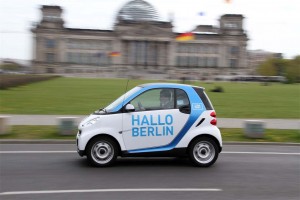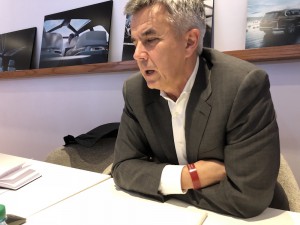
A mobility enterprises, like Daimler's alliance with the Car2Go car-sharing service, are going to partner with BMW.
In what is being described as a “historic” move, traditional arch-rivals BMW and Mercedes-Benz have announced plans to merge their many and varied mobility services operations in a bid to make it easier to get “from Point A to B seamlessly,” no matter what form of transportation you use.
The two German automakers are already big players in the emerging field of mobility services, among other things partnering with taxi fleets and parking structures while operating both car- and ride-sharing services in a number of cities around the world. The new joint venture will also work with mass transit systems and even with the public bicycle services popping up in many urban areas.
“Our goal is to provide mobility services at levels so far unheard of,” said Peter Schwarzenbauer, the BMW AG board member who helped negotiate the alliance.
It’s widely expected that there will be major changes in the way people use transportation over the coming decades. That includes the emergence of ride-sharing services using fully robotized vehicles that, according to a recent Boston Consulting Group study, will account for a quarter of the miles Americans travel by road by 2030.
(Mercedes-Benz Bank changes the way it does business. Click Here for the story.)

BMW's Peter Schwarzenbauer said the new partnership's goal is provide unparalleled mobility services.
Millennials are one of the key drivers, studies showing they are far less interested in owning a personal vehicle and are more open not only to ride- and car-sharing but mass transit and even renting bicycles to move around city centers.
The joint venture company Mercedes and BMW hope to form will be aimed at both increasing the number of transportation alternatives available to city and suburban dwellers around the world, but also to make it easier to jump from one mode to another. Use a car-sharing service to the train station for the trip downtown, Schwarzenbauer explained, then switch to a subway, a ride-sharing service or even a bicycle to get to work.
And the plan is to make it possible to handle everything through a single smartphone app, rather than apps for each individual service.
There are five “pillars” to the yet-to-be-named venture, the executive, a 30-year automotive veteran, explained.
- BMW and Mercedes will combine their current car-sharing services, ReachNow and Car2 Go, which already have a strong presence in such U.S. cities as Seattle, San Francisco and Austin;
- They will expand existing ventures in both ride-sharing ventures – targeting the likes of Uber and Lyft – as well as more conventional taxi services;
- They already provide services making it easier to find and use parking in more than 1,000 cities and that will expand to the next level, even tying into street parking;
- They will expand the availability of public battery-car chargers – and make it easier to find and use those facilities
- And they will work to develop a simple “intermodal” model using smartphone technology, linking both public and private services.
BMW and Mercedes aren’t the only ones looking at ways to play in the emerging world of mobility services. Volvo has been running a small, intermodal pilot program in Sweden. Ford, meanwhile, has repositioned itself as a “mobility company,” rather than a car manufacturer. It is expanding a number of alternative services, rapidly expanding its shuttle-on-demand service Chariot in the U.S. and, soon, in the UK.
(Click Here for details about Daimler investing millions in financing app.)
Industry analysts say such moves could prove critical. As more and more people look for transportation alternatives, such as ride-sharing, car sales could tumble sharply, former Ford CEO Mark Fields told TheDetroitBureau.com. Some estimate the decline could amount to more than five million vehicles annually in the U.S., or nearly a third of 2017 sales.
So, BMW and Mercedes are clearly hoping to find ways to ride out the changes. They hope to generate growing revenues from car- and ride-sharing services – while providing a market for the vehicles they will continue to build. They’ll also take a share of what partner services make, whether a bus ticket or a bicycle rental.
The alliance, meanwhile, underscores the changing nature of the global auto industry which is seeing more and more tie-ups between erstwhile competitors. Honda and General Motors are teaming up to develop and build hydrogen fuel-cell technology. Mazda and Toyota are developing new electric vehicles they will jointly produce at a new U.S. plant.
(For more on BMW’s plans to up EV and AV spending, Click Here.)
In fact, this isn’t the first time BMW and Mercedes found reason to work together. They started working together on a wireless charging system for electric vehicles and, more recently, joined a consortium that purchased a data company that will provide high-definition mapping for the autonomous and fully driverless vehicles that may soon be used in the latest alliance’s ride-sharing vehicles.
